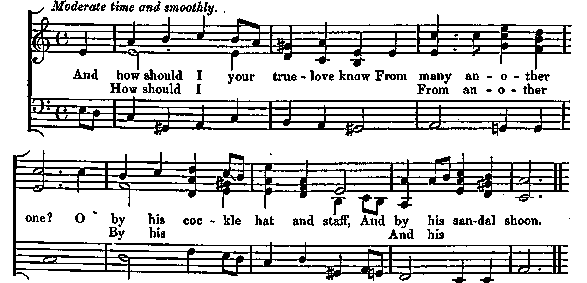Popular Music Of The Olden Time Vol 1
Ancient Songs, Ballads, & Dance Tunes, Sheet Music & Lyrics - online book
| Share page | Visit Us On FB |
|
236 ENGLISH SONG AND BALLAD MUSIC |
|||
|
You hawk, you hunt, you lie upon pallets,
You eat, you drink (the Lord knows how !); We sit upon hillocks, and pick up our sallets,
And drink up a syllabub under a cow.
With a fading.
Your masks are made for knights and lords,
And ladies that go fine and gay ; We dance to such music the bagpipe affords,
And trick up our lasses as well as we may. With a fading. |
Your clothes are made of silk and satin, And ours are made of good sheep's gray;
You mix your discourse with pieces of Latin, We speak our. English as well as we may. With a fading.
You dance Corants and the French Braul, We jig the Morris upon the green,
And make as good sport in a country hall, As you do before the King and the Queen. With a fading. |
||
|
|
|||
|
HOW SHOULD I YOUR TRUE LOVE KNOW ? The late "W. Linley (an accomplished amateur, and brother of the highly-gifted Mrs. Sheridan) collected and published "the wild and pathetic melodies of Ophelia, as he remembered them to have been exquisitely sung by Mrs. Forster, when she was Miss Field, and belonged to Drury Lane Theatre;" and he says, "the impression remained too strong on his mind to make him doubt the correctness of the airs, agreeably to her delivery of them." Dr. Arnold also noted them down from the singing of Mrs. Jordan, and Mr. Ayrton has followed that version in his Annotations to Knight's Pictorial Edition of Shakespeare. The notes of this air are the same in both; but in the former it is in 4 time, in the latter in common time. The melody is printed in common time in The Beggars' Opera (1728) to " You'll think, ere many days ensue," and in The Grenerous Freemason, 1731.
Dr. Percy selected some of the fragments of ancient ballads which are dispersed through Shakespeare's plays, and especially those sung by Ophelia in Samlet, and connected them by a few supplemental stanzas into his charming ballad, The Friar of Orders Gray, the first line of which is taken from one, sung by Petruchio, in The Taming of the Shrew.
The following is the tune; but in singing Ophelia's fragments, each line should •begin on the first of the bar, and not with the note before it. In the ballad-operas it has the burden, Twang, lang, dildo dee at the end, with two additional bars of music, the same as to The Knight and Shepherd's Daughter. See p. 127. |
|||
|
|
|||
 |
|||
|
|
|||
|
He is dead and gone, lady,
He is dead and gone ; At his head a green grass turf, |
White his shroud as mountain snow,
Larded with sweet flowers, Which bewept to the grave did go |
||